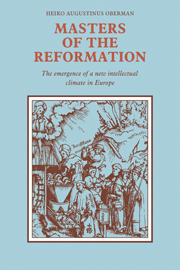Book contents
- Frontmatter
- Contents
- Preface
- Abbreviations
- Map
- PART I INTELLECTUAL RENEWAL
- 1 The ivory tower: the university as observatory
- 2 The impact of humanism: fact and fancy
- 3 The scholastic rift: a parting of the ways
- 4 The devotio moderna: movement and mystery
- 5 Patterns of thought on the eve of upheaval
- 6 The Augustine renaissance in the later Middle Ages
- PART II THE GRAPES OF WRATH
- PART III NEW JERUSALEM WITHIN THE OLD WALLS
- Student population at German universities 1385–1540
- Chronological outline
- Bibliography
- Index of names and places
- Index of modern authors
- Subject index
1 - The ivory tower: the university as observatory
Published online by Cambridge University Press: 07 October 2011
- Frontmatter
- Contents
- Preface
- Abbreviations
- Map
- PART I INTELLECTUAL RENEWAL
- 1 The ivory tower: the university as observatory
- 2 The impact of humanism: fact and fancy
- 3 The scholastic rift: a parting of the ways
- 4 The devotio moderna: movement and mystery
- 5 Patterns of thought on the eve of upheaval
- 6 The Augustine renaissance in the later Middle Ages
- PART II THE GRAPES OF WRATH
- PART III NEW JERUSALEM WITHIN THE OLD WALLS
- Student population at German universities 1385–1540
- Chronological outline
- Bibliography
- Index of names and places
- Index of modern authors
- Subject index
Summary
Gabriel Biel died on 7 December 1495 as prior of an experimental house of the Brethren of the Common Life, St Peter's at the Hermitage, near Tübingen. Like the university which Biel served from 1485 to ca. 1490, St Peter's had been founded on the initiative and with the healthy support of Count Eberhard im Bart of Württemberg. In a previous study we examined the late medieval system of theology and philosophy known as nominalism, especially as exemplified in the life and works of Biel, and concluded with some remarks on the catholicity of that much maligned theology. In the following pages we shall pursue the legacy of Gabriel Biel and the adherents of his via moderna as they walked and warred with the via antiqua amid the tempests that would eventually transform a catholic Europe into three separate ‘confessions’ plus an assortment of left-wing splinter groups.
The centrality of the university to any understanding of this period is as unquestionable as it is ill-defined. Early parochial chronicles portray the university itself as the mainstream, the source of a supposed ‘golden era’ in which the evils of a disintegrating society would be abolished. University erudition not only signified the growing pride of a German nation ready to compete as an equal on the playing fields of cultured Europe; it also meant escape from the dark ages, now sensed to be at their most threatening.
- Type
- Chapter
- Information
- Masters of the ReformationThe Emergence of a New Intellectual Climate in Europe, pp. 3 - 14Publisher: Cambridge University PressPrint publication year: 1981



